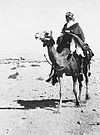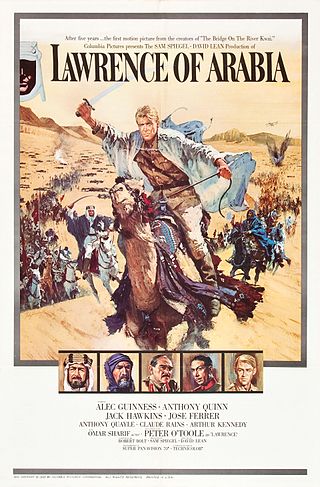
Lawrence of Arabia is a 1962 epic biographical adventure drama film based on the life of T. E. Lawrence and his 1926 book Seven Pillars of Wisdom. It was directed by David Lean and produced by Sam Spiegel through his British company Horizon Pictures and distributed by Columbia Pictures. The film stars Peter O'Toole as Lawrence with Alec Guinness playing Prince Faisal. The film also stars Jack Hawkins, Anthony Quinn, Omar Sharif, Anthony Quayle, Claude Rains and Arthur Kennedy. The screenplay was written by Robert Bolt and Michael Wilson.
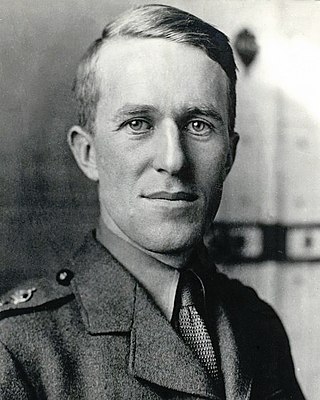
Thomas Edward Lawrence was a British Army officer, archaeologist, diplomat and writer known for his role during the Arab Revolt and Sinai and Palestine campaign against the Ottoman Empire in the First World War. The breadth and variety of his activities and associations, and Lawrence's ability to describe them vividly in writing, earned him international fame as Lawrence of Arabia, a title used for the 1962 film based on his wartime activities.

The San Remo conference was an international meeting of the post-World War I Allied Supreme Council as an outgrowth of the Paris Peace Conference, held at Castle Devachan in Sanremo, Italy, from 19 to 26 April 1920. The San Remo Resolution passed on 25 April 1920 determined the allocation of Class "A" League of Nations mandates for the administration of three then-undefined Ottoman territories in the Middle East: "Palestine", "Syria" and "Mesopotamia". The boundaries of the three territories were "to be determined [at a later date] by the Principal Allied Powers", leaving the status of outlying areas such as Zor and Transjordan unclear.

The Emirate of Transjordan, officially known as the Amirate of Trans-Jordan, was a British protectorate established on 11 April 1921, which remained as such until achieving formal independence as the Kingdom of Jordan in 1946.

Faisal I bin al-Hussein bin Ali al-Hashemi was King of Iraq from 23 August 1921 until his death in 1933. A member of the Hashemite family, he was a leader of the Great Arab Revolt during the First World War, and ruled as the unrecognized King of the Arab Kingdom of Syria from March to July 1920 when he was expelled by the French.
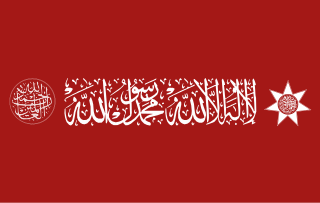
The Hashemites, also House of Hashim, are the royal family of Jordan, which they have ruled since 1921, and were the royal family of the kingdoms of Hejaz (1916–1925), Syria (1920), and Iraq (1921–1958). The family had ruled the city of Mecca continuously from the 10th century, frequently as vassals of outside powers, and ruled the thrones of the Hejaz, Syria, Iraq, and Jordan following their World War I alliance with the British Empire.
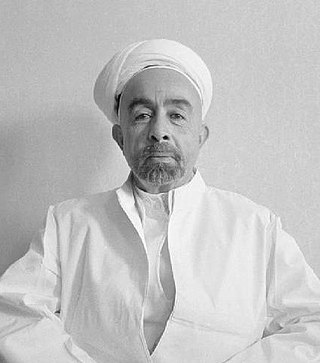
Abdullah I bin Al-Hussein was the ruler of Jordan from 11 April 1921 until his assassination in 1951. He was the Emir of Transjordan, a British protectorate, until 25 May 1946, after which he was king of an independent Jordan. As a member of the Hashemite dynasty, the royal family of Jordan since 1921, Abdullah was a 38th-generation direct descendant of Muhammad.

The Sykes–Picot Agreement was a 1916 secret treaty between the United Kingdom and France, with assent from Russia and Italy, to define their mutually agreed spheres of influence and control in an eventual partition of the Ottoman Empire.
The McMahon–Hussein correspondence is a series of letters that were exchanged during World War I, in which the government of the United Kingdom agreed to recognize Arab independence in a large region after the war in exchange for the Sharif of Mecca launching the Arab Revolt against the Ottoman Empire. The correspondence had a significant influence on Middle Eastern history during and after the war; a dispute over Palestine continued thereafter.

Harry St John Bridger Philby, CIE, also known as Jack Philby or Sheikh Abdullah, was a British Arabist, advisor, explorer, writer, and a colonial intelligence officer who served as an advisor to King Abdulaziz ibn Saud, the founder of Saudi Arabia.
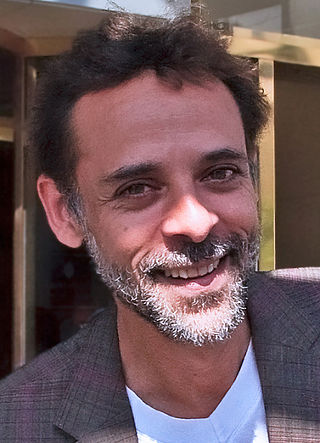
Siddig El Tahir El Fadil El Siddig Abdurrahman Mohammed Ahmed Abdel Karim El Mahdi is a British actor and director known professionally as Siddig El Fadil and subsequently as Alexander Siddig.

The Arab Revolt, also known as the Great Arab Revolt, was an armed uprising by the Hashemite-led Arabs of the Hejaz against the Ottoman Empire amidst the Middle Eastern theatre of World War I.

The Faisal–Weizmann agreement was signed by Emir Faisal, the third son of Hussein ibn Ali al-Hashimi, King of the short-lived Kingdom of Hejaz, and Chaim Weizmann, President of the Zionist Organization on 3 January 1919. Signed two weeks before the start of the Paris Peace Conference, it was presented by the Zionist delegation alongside a March 1919 letter written by T. E. Lawrence in Faisal's name to American Zionist leader Felix Frankfurter as two documents to argue that the Zionist plans for Palestine had prior approval of Arabs.

The Hashemite Kingdom of Hejaz was a state in the Hejaz region of Western Asia that included the western portion of the Arabian Peninsula that was ruled by the Hashemite dynasty. It was self-proclaimed as a kingdom in June 1916 during the First World War, to be independent from the Ottoman Empire, on the basis of an alliance with the British Empire to drive the Ottoman Army from the Arabian Peninsula during the Arab Revolt.

The Great Syrian Revolt, also known as the Revolt of 1925, was a general uprising across the State of Syria and Greater Lebanon during the period of 1925 to 1927. The leading rebel forces initially comprised fighters of the Jabal Druze State in southern Syria, and were later joined by Sunni, Druze and Shiite and factions all over Syria. The common goal was to end French occupation in the newly mandated regions, which passed from Turkish to French administration following World War I.
This is a timeline of major events in the history of the modern state of Jordan.
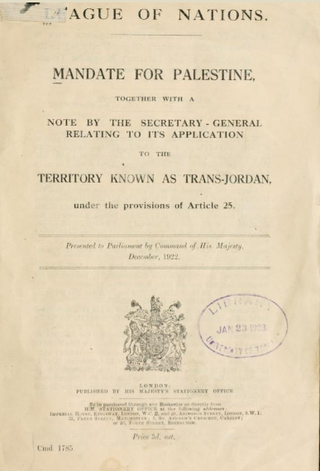
The Mandate for Palestine was a League of Nations mandate for British administration of the territories of Palestine and Transjordan – which had been part of the Ottoman Empire for four centuries – following the defeat of the Ottoman Empire in World War I. The mandate was assigned to Britain by the San Remo conference in April 1920, after France's concession in the 1918 Clemenceau–Lloyd George Agreement of the previously agreed "international administration" of Palestine under the Sykes–Picot Agreement. Transjordan was added to the mandate after the Arab Kingdom in Damascus was toppled by the French in the Franco-Syrian War. Civil administration began in Palestine and Transjordan in July 1920 and April 1921, respectively, and the mandate was in force from 29 September 1923 to 15 May 1948 and to 25 May 1946 respectively.
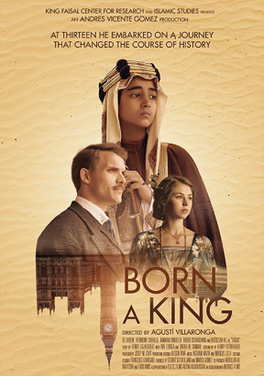
Born a King is a 2019 historical coming-of-age drama film directed by Agustí Villaronga. The film stars Abdullah Ali, Ed Skrein, Hermione Corfield, Laurence Fox, and James Fleet.
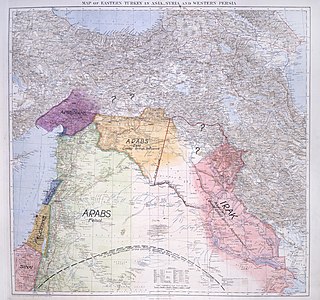
The Sharifian or Sherifian Solution was an informal name for post-Ottoman British Middle East policy and French Middle East policy of nation-building. As first put forward by T. E. Lawrence in 1918, it was a plan to install the three younger sons of Hussein bin Ali al-Hashimi as heads of state in newly created countries across the Middle East, whereby his second son Abdullah would rule Baghdad and Lower Mesopotamia, his third son Faisal would rule Syria, and his fourth son Zeid would rule Upper Mesopotamia. Hussein himself would not wield any political power in these places, and his first son, Ali would be his successor in Hejaz.
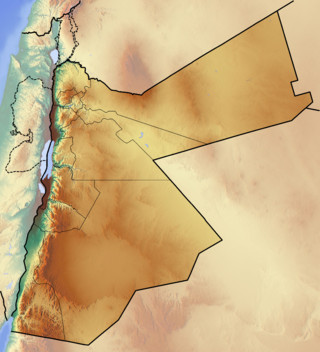
The Jordan–Saudi Arabia border is 731 km (454 mi) in length and runs from the Gulf of Aqaba in the south-west to the tripoint with Iraq in the north-east.



















